- Home
- Julia London
The Lovers: A Ghost Story
The Lovers: A Ghost Story Read online
The Lovers: A Ghost Story
The Lovers: A Ghost Story
Midpoint
The Lovers
A Ghost Story
Julia London
Smashwords Edition
Copyright 2011 Julia London
Smashwords Edition, License Notes
This ebook is licensed for your personal enjoyment only. This ebook may not be re-sold or given away to other people. If you would like to share this book with another person, please purchase an additional copy for each recipient. If you’re reading this book and did not purchase it, or it was not purchased for your use only, then please return to smashwords.com and purchase your own copy. Thank you for respecting the hard work of this author.
Dear Reader:
The Lovers: A Ghost Story is a short story I wrote to be included in the Mammoth Book of Ghost Romance. I write historical romance and contemporary women’s fiction with strong romantic elements, and I saw this as a great opportunity to blend those two sub-genres together into a spooky little story just in time for Halloween.
Please visit my website at http://www.julialondon.com for all my news and to sign up for my newsletter. You may also find me on Facebook, Twitter, Goodreads, and Tumblr.
Happy Halloween,
Julia
York, 1898
Agnes Whitstone admired herself from all angles in the mirror. She was wearing a gown her father had commissioned for her to wear to the York Spring Cotillion Ball, and she’d never seen a more beautiful garment. It was gold, with dark green trim. The décolletage was enticingly low, which had alarmed her mother, but thrilled Agnes.
Her father was determined that his daughters would be the most fashionably turned out at the Cotillion Ball. It was his belief that in addition to a young lady’s usual accomplishments and impeccable manners, if she looked to come from means, her prospects for marriage were that much improved.
But Agnes had already accepted an offer of marriage. And this was the gown that she would wear to her wedding. Which would occur sometime tomorrow. And for the next eight hours, she had only to pretend that all was quite ordinary.
But she was busting with excitement.
John Parker, her beloved, had said she must not confess to anyone what they intended to do. John said that if she told as much as one sister, her father would hear of it and find a way to keep them from their heart’s desires. “Be patient, my love,” he’d said this afternoon, when they’d met secretly in the potter’s shed behind the apple orchard, “do as I ask and we shall be man and wife by this time tomorrow.”
At seventeen, it was very difficult for Agnes to be patient. She and John Parker had been in love for what seemed ages. They’d been introduced to one another after church services one day. She’d felt an instant attraction sweep her up and wrap its arms tightly around her. John had sent her a letter very soon afterward in which he’d proclaimed his esteem, as well, and now, they stood on the cusp of a lifelong conjugal happiness.
“I can scarcely look at my sisters, for I fear I will burst with the news!” Agnes had moaned when John had warned her to keep their secret.
“Not a word, Agnes,” John had said, and he’d kissed her silent, his mouth on her bosom, his hand beneath her skirts, roaming to spots that had never been touched by another person, places that made her swell and stir and yearn desperately for more.
“Make love to me,” she whispered into his neck.
“Hush,” he said, his voice drifting over her like a silken drape as he pressed the palm of his hand against her breast. “I can scarcely contain my desire for you as it is without such enticements from you.” He kissed her lips.
“We are leaving today. Why must we wait?” Agnes complained, and caught a breath in her throat as his hand drifted up her ankle, to the inside of her thigh.
“We have survived this long.” He kissed her cheek. “The anticipation will make our coupling that much sweeter.”
Agnes shivered and closed her eyes, lifting her face to him. His lips singed her, made her roast with desire. She had heard tales of the marriage bed, of the duty of a woman to her husband, as if it were something to be feared. But if it were anything like this, she thought, as John’s hand cupped her breast, she would as soon live in her marriage bed as in the world. There was no feeling quite like it, nothing that made her heart fill to bursting as her love for him made her feel—dizzy, weightless. Adored.
“Agnes,” he whispered against the hollow of her throat, then down further still, to the mound of her breast.
Agnes let her head fall back, relishing the thrill of his hands and mouth on her body. He freed her breast, taking it into his mouth.
Agnes gasped wildly and pressed against him as he drove her to madness. She was wet with desire, aroused like a sleeping dragon. Her hands flit across his temples, his shoulders, his neck. She thrust her fingers in his hair, squeezed her legs around him and fought the abandon inside her.
John responded with desire as hard and heavy as her own. He ravaged her, teething the rigid nipple while his hand danced around to the apex of her legs, then slid into the damp folds. Agnes though she might expire from pleasure when John, dear John, suddenly stopped.
“God help me, but I cannot resist you,” he said roughly. He rose up, caressed her hair, and looked into her eyes before kissing her once more. “But resist you I must, for a few hours more. Then, you will be my wife, Agnes, and I will have you as a husband ought to have his wife.” With that, he sat up, pulling her up with him. “Go,” he said. “Go and ready for tonight.”
Agnes reluctantly did as he asked. Her body was still burning, her heart still throbbing. She saw such desire in his eyes that she could not suppress a shiver. But he smiled, kissed her knuckles, and smoothed her hair. “I love you, lass,” he said. “I love you more than I can possibly express.”
Agnes smiled and leaned up to kiss him. “I love you, John. You are my heart.”
They left the shed, walking into air that was warm and moist. They did not notice the winds had picked up and the smell of rain was in the air. As they walked, John gripped Agnes’s hand and made her review their plans again. At the stroke of midnight, when Agnes could be certain everyone was abed, she would meet John at the potter’s shed. He had a horse, which they would ride to York. From York, they would board a train to Scotland and Gretna Green, where they would marry at once. They had agreed that no matter the weather, they would make their escape.
She had only to wait a few hours more.
With a sigh, Agnes removed her gown and returned to her simple green day gown and folded the gown she would wear to her wedding very carefully.
When John had asked for her hand, she’d wanted to go to her father straightaway, but John had cautioned her against it. He’d suspected her father would not approve, and he’d been right.
“John Parker?” her father had boomed when Agnes, egged on by her sister Aurora, had announced one evening that she esteemed him. “You will take your esteem elsewhere, Agnes Whitstone. John Parker is not of a station to marry my daughter.”
“Whatever do you mean?” Agnes had cried, deeply offended that anyone would find John less than perfect.
“He is the son of a carpenter. You are the daughter of a man who owns the county’s largest mercantile,” her father had boomed. “These are two occupations that do not suit in business, in pleasure, and certainly not in marriage.” He’d lifted his newspaper to thwart any argument. “You will set your sights on someone of a proper caliber, or I shall do it for you.”
Her father’s opinion of John had not improved with time, and Agnes had become increasingly agitated. It was John’s suggestion that they elope. Oh, but Agnes longed to tell her sister Es
me, who was closest to her in age and demeanor. But it would have been no use—Esme could scarcely think of anything else than the spring ball.
Agnes wrapped her wedding gown and a pair of embroidered slippers in a cloth, bundled it, and slipped it under her bed. When she was satisfied it was well hidden, she glanced out the window at the early spring day. The weather was cool and blustery, but otherwise a perfect day to elope.
She did not notice the gathering of clouds to the west.
Her bundle ready, Agnes sat down to her last task as an unmarried woman. She wrote a letter to her parents that she intended to leave on her bed.
Dearest Mother and Father please do not be cross when you find this letter and understand what I have done. I do not mean to cause you pain, but I love John Parker with all my heart and cannot bear to be without him. We are quite determined we shall not be kept apart. Do not come for me, for by the time you read this, we will have crossed into Scotland and will have pledged our lifelong devotion to one another. We intend to reside in York, where John has arranged the let of a small house on Queen Street. Esme will want my chamber, and I am pleased that she should have it. Your devoted daughter, Agnes.
***
The rain began just after eight that evening. The family was gathered in the drawing room, where Father liked to read from the Scriptures. Agnes’s eyes were trained on the mullioned windows, watching the rivulets of rain on the panes of glass. A gust of wind rattled one window that was not entirely closed; Mrs. Whitstone hurried to latch it shut. “Good heavens, it will be quite a storm,” she said, shivering.
As her father droned on from the Gospel of Mark, Agnes fretted. She reasoned that the storm would surely pass by midnight. But the storm did not pass. The deluge continued with great sheets of rain, long after the family had retired. Agnes prepared nonetheless; she retrieved the letter she’d written to her family and gathered her bundle. She dressed in a sturdy traveling gown and cloak, and boots. When the clock struck midnight, Agnes looked out the window and winced. It was still raining, and the wind was blowing quite strongly. But it seemed that the lightning had moved to the east. Agnes blew out her candle, picked up her bundle, and opened the door.
She made her way carefully along the darkened corridor. As she reached the top of the stairs, she saw something below that looked like the flicker of a candle. Agnes froze. She peered into the dark, straining to see.
There it was again—someone was moving about downstairs, carrying a single candle. Agnes jumped back, her heart racing. Who was it, her mother? God help her, but she’d heard her mother complain there were nights she could not sleep. Agnes hurried back to her room and shut the door. She stood with her back to the door in that darkened room, desperate to know what to do, imagining John at the potter’s shed, waiting for her.
Agnes whirled around and pressed her ear to the door, but it was impossible to hear anything with the storm raging outside. She looked at the window; a thought occurred to her, and she rushed to the window and opened it. Rain lashed her face and cloak; Agnes reared back and quickly pulled her hood over her blond hair, then leaned out again.
The drop to the ground was quite a long way, but she tossed her bundle out all the same. Directly next to her window was a tree with an overhanging limb. She had once excelled at tree climbing, and had managed this limb more than once. It scraped against the house, and she could stand on the window ledge and catch it, then swing down to a spot on the tree on which she could stand. She’d done it dozens of times.
Agnes looked down. There was her bundle on the ground below her, getting soaked by the rain. Her beautiful gown—it would be ruined! She pushed the window up higher and maneuvered one leg out. Then the other. Using the edge of the window recess, she managed to inch her way up to her feet.
The rain seemed to fall harder, and the branch danced before Agnes. She drew a breath, thought of John, and jumped. But the wind gusted at the moment she jumped, pushing the branch up just out of her reach.
Agnes’s last conscious thought as the ground rushed up to greet her was that John would think she hadn’t come.
In the years that followed, people would say it was the worst storm they’d seen in a generation. Agnes was not found until the following afternoon. Agnes’s mother thought she’d done Agnes a kindness about allowing her to sleep while the wretched rain fell, but by mid-morning, there were too many chores to do to allow the girl to sleep the day away. When Agnes’s mother found the note, and saw the open window, she screamed for her husband. She did not look out the window; she assumed Agnes was well on her way to Scotland.
The groundskeeper found Agnes’ body while friends searched for the young lovers. She was a bit waterlogged, and her neck was bent at an odd angle. Her hair had come undone and was strewn across her blue face like gold seaweed.
John Parker was found in the apple orchard near an old potter’s shed the following day. He’d died by his own hand, his fingers still curled around the gun. He’d left a note, full of the anguish of guilt and loss of his beloved.
There were those in the villages around Whitstone House who privately hoped the young lovers would be united in the hereafter.
***
Matthew and Hillary Sparks rocked down a pitted road in a rented car so small that one might have sworn it had previously housed two servings of peas. They came to a dead stop where the road met a circular drive and both leaned forward, peering through the bug-splattered front window of the car.
“That’s it?” Hillary asked.
“I guess so,” Matthew said. He turned off the car and climbed out.
Hillary reluctantly did the same. She was not exactly thrilled with this latest development in their lives. When Matthew’s mother had died last year, he’d discovered that he and his two siblings had inherited an old house in England. England! It was the first the three of them had heard of any house in England that any of them could recall, and they were shocked to discover that their mother had inherited it from a distant relative fifteen years prior. She’d never mentioned it, but then again, his mother had been suffering from a form of dementia. Perhaps she never understood she’d been willed a whole house.
Matthew was astounded and especially curious about the house. Of all of the siblings, he could afford to be—he’d been laid off from work when the recession hit. In some ways, Hillary believed this house had become a substitute for a job.
One day, when Hillary came home from work, Matthew told her they were going to England. “Neither Craig nor Elaine can go right now,” he’d explained, referring to his siblings. “So we need to go.”
“I can’t go,” Hillary had said quickly, shocked that he would think that she could. She had a thriving real estate business in the Hudson Valley, specializing in high-end properties. How could she go to England? Had he forgotten that she was the sole source of their income?
But he’d said, somewhat dismissively, “You can go. I talked to your mom and she said she’d be happy to have the twins for a couple of weeks this summer.”
“You talked to my mother before you talked to me?” Hillary’s blood pressure had begun to rise, but that was par for the course these last few months. Their marriage was on shaky ground, and apparently, he’d decided they would take their troubled marriage and go to England, right in the middle of the house-buying season in the States to see some old house that his mother hadn’t even mentioned. Hillary could picture it: a dump, some crumbling little cottage where cows walked in and out, feasting on the thatched roof. It would be more work than it was worth. And for that, she was supposed to take time away from the job that kept a roof over their heads.
Matthew no longer spoke to her—he informed her of decisions he had no right to decide, like some king on a throne.
It had been like this between them since Matthew had lost his corporate job at a national mortgage company. The housing industry had turned belly up like some diseased whale, and it was a miracle that Hillary had managed to hang on to her business.
But then again, she’d spent ten years cultivating her clients, and she was dealing in properties that were recession-proof, and her job provided them with a good standard of living.
But Matthew seemed to grow more distant the more apparent it became that she could provide them with a good living and he couldn’t find a job.
At first, he’d believed he’d find another job very quickly. “I’ve got some major experience,” he’d said confidently when the pink slip had come. “I’m not worried. I don’t want you to worry, either.”
She didn’t worry. In the first couple of months, Matthew had papered banks and mortgage companies and financial institutions with his stellar resume. He had been upbeat when he’d called his contacts. Several people promised him he had a leg up.
But the weeks dragged by and nothing came of it.
“The economy sucks right now, bro,” his friend, a banker at a national bank, told him. “No one’s hiring. You might have to ride it out.”
Hillary knew that men tended to be defined by their jobs and their incomes, and without them, they could feel emasculated. Matthew was not the sort of guy who could ride things out. He needed to be doing, to be moving and shaking, and it had become clear that when he wasn’t doing those things, he didn’t quite know what to do. Six months after the pink slip came, Matthew was beginning each day in his pajamas, in front of ESPN Sportscenter. He snapped when Hillary asked him what his plans were. He grew impatient with their six year-old twins, Mickey and Mallory. Hillary and Matthew’s sex life took a long vacation.
Hillary tried to talk to him about it. “I feel like we aren’t…connecting,” she’d said one day when he’d met her for lunch. They weren’t connecting emotionally, sexually, or even casually. But the moment she’d said it out loud, Matthew had looked down at his plate and sighed. “Hillary, come on,” he’d said. “I’m going through a hard time. Can you just…let it go for now?”

 A Royal Kiss & Tell
A Royal Kiss & Tell You Lucky Dog
You Lucky Dog The Devil in the Saddle
The Devil in the Saddle The Trouble with Honor
The Trouble with Honor Tempting the Laird
Tempting the Laird The Secret Lover
The Secret Lover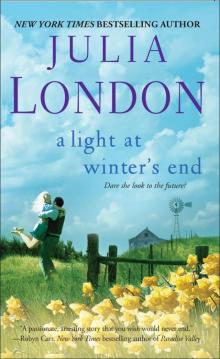 A Light at Winter’s End
A Light at Winter’s End The Charmer in Chaps
The Charmer in Chaps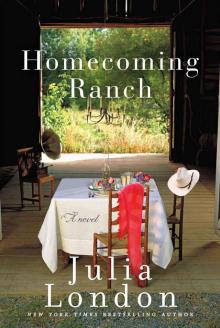 Homecoming Ranch
Homecoming Ranch Jack (7 Brides for 7 Soldiers Book 5)
Jack (7 Brides for 7 Soldiers Book 5) A Courtesan's Scandal
A Courtesan's Scandal Hard-Hearted Highlander--A Historical Romance Novel
Hard-Hearted Highlander--A Historical Romance Novel The Complete Novels of the Lear Sister Trilogy
The Complete Novels of the Lear Sister Trilogy The Last Debutante
The Last Debutante Suddenly Single (A Lake Haven Novel Book 4)
Suddenly Single (A Lake Haven Novel Book 4) Seduced by a Scot
Seduced by a Scot Highlander Unbound
Highlander Unbound Suddenly Dating (A Lake Haven Novel Book 2)
Suddenly Dating (A Lake Haven Novel Book 2)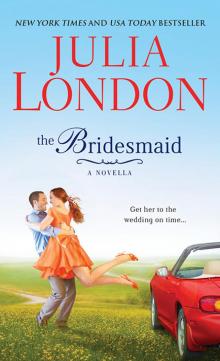 The Bridesmaid
The Bridesmaid The Seduction of Lady X
The Seduction of Lady X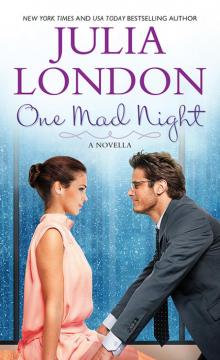 One Mad Night
One Mad Night Extreme Bachelor
Extreme Bachelor The Scoundrel and the Debutante
The Scoundrel and the Debutante The Revenge of Lord Eberlin
The Revenge of Lord Eberlin American Diva
American Diva The Lovers: A Ghost Story
The Lovers: A Ghost Story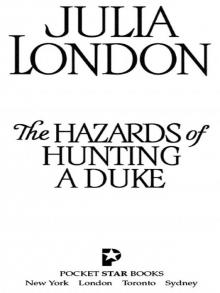 The Hazards of Hunting a Duke
The Hazards of Hunting a Duke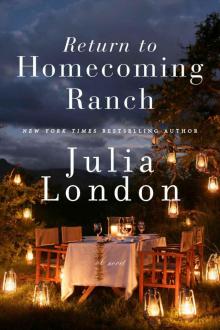 Return to Homecoming Ranch (Pine River)
Return to Homecoming Ranch (Pine River)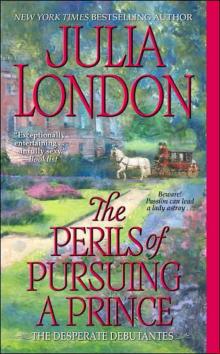 The Perils of Pursuing a Prince
The Perils of Pursuing a Prince Highlander in Love
Highlander in Love The Devil Takes a Bride
The Devil Takes a Bride Devil in Tartan
Devil in Tartan Wild Wicked Scot
Wild Wicked Scot Snowy Night with a Highlander
Snowy Night with a Highlander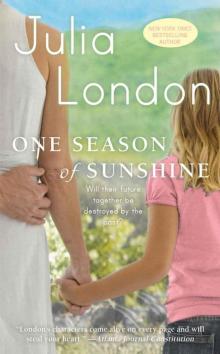 One Season of Sunshine
One Season of Sunshine Summer of Two Wishes
Summer of Two Wishes All I Need Is You aka Wedding Survivor
All I Need Is You aka Wedding Survivor Sinful Scottish Laird--A Historical Romance Novel
Sinful Scottish Laird--A Historical Romance Novel Suddenly Engaged (A Lake Haven Novel Book 3)
Suddenly Engaged (A Lake Haven Novel Book 3) Highlander in Disguise
Highlander in Disguise Suddenly in Love (Lake Haven#1)
Suddenly in Love (Lake Haven#1)